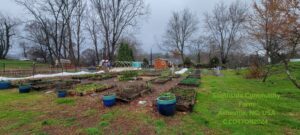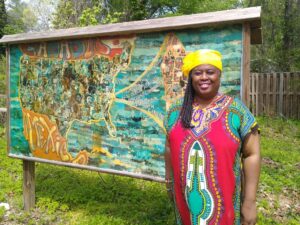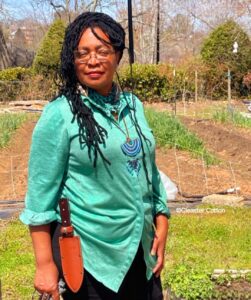
Farmer’s name: Southside Community Farm, Phyllis Utley & Cleaster Cotton
Acreage: 0.5 acres
Location: Asheville, NC
Method of Access: handshake
Year Founded: 2014
Farm Operation: Vegetables and herbs
Asheville’s Southside Community Farm
In the historic town of Asheville, North Carolina, a resilient community of growers and friends of the Southside Community Farm are fighting to preserve their 0.5-acre community farm. The land is legally owned by the Housing Authority of the City of Asheville (HACA) and governed by its Board of Directors. A resolution has been filed with HACA to turn the land into a playground, but the farm has gathered community support to save the farm. (The resolution has not been voted on as of July 2024.) The farm’s occupation of the land originated from a handshake deal between the housing authority and the farm founders, as shared by long-time advocate and resident Phyllis Utley. Despite the request to turn the farm into a playground, the community continues to cultivate and distribute fresh food, offer educational programs to community members of all ages, and serves as a central food and community hub in a food-insecure area.
Loss and Preservation of Agricultural land
This story is important because it illustrates the fragility of land use, access, and retention for marginalized communities and underscores the demand for agricultural land and impacts of significant loss of agricultural land to urbanization. A recent modeling study shows that among all possible agricultural land losses due to urbanization, nearly 9 million acres will occur on nationally significant land, defined as the most productive, versatile, and resilient. That same study predicts the U.S. Southeast will experience the most significant agricultural land losses, with North Carolina forecasted to lose nearly 1.2 million acres to residential and high development by 2040.
Protecting a half-acre may not seem that important. But it is an important and crucial asset to the community it serves. Additionally, because agricultural land is hard to secure and urban farmers are constantly threatened with losing their land due to development, even a half acre has tremendous significance..
“When stewarding city land, I’m always putting myself at risk. There’s a pain when a community loses a farm; it’s grief.” When recalling a garden built on a former baseball field that is now demolished, Phyllis describes the space as “a grave site for what was,” highlighting the profound emotional connection held with community-stewarded land.
Cleaster Cotton, a grower and supporter of Southside Community Farm, names an additional important attribute of the farm: “It helps those still healing from the trauma of farming in the fields due to slavery. The garden is a healing space for generational trauma. Losing critical garden space is stealing through generations, a repeat of the violation. This space is healing that history.” Her poignant words evoke a more modern yet related history of Asheville, which removed 1200 black-owned homes from the Southside/East Riverside historic African American community in the 1970s and 1980s under the auspices of “urban renewal.”
A farm near Southside Community Farm presents another example of land ownership and community stewardship. Shiloh Community Association (SCA) preserves history as one of Asheville’s long-lasting historic African-American communities. In the 1940s, predecessor organizations (the Community League and Shiloh Residents Association) purchased a corner lot that became a recreation center hosting community events and local baseball games. When the building was demolished after a fire in 2005, the sole surviving trustee of the League, Lawrence Wilson, donated the land to the Shiloh Community Association to develop the Shiloh Community Garden.
Friends and Stewards of Southside Community Farm:
Phyllis Utley
Phyllis “Sunshine” Utley is a native of the Carolinas with afro-indigeneity to Ye Iswa, People of the River Otter Clan, who are commonly known as Catawba. Her work extends through many mediums, including wealth liberation, reparations, public policy, and artistry. Despite her maternal great-grandmother owning land in North Carolina, the family was compelled to leave the South and settle in the Northeast due to racial and political pressure. After raising a family of 22 children, she moved back to the South to care for other family members and reestablish familial land.
Phyllis experienced challenges establishing her own micro-farm has a complaint pending as part of the USDA Discrimination Financial Assistance Program. Despite the adversity, she was able to get a USDA farm and track number, and is cultivating her home and farm, stating, “I want this home to be a place social justice advocates can come and rest.”
Phyllis is a pivotal figure in the ongoing battle against historical injustice faced by African Americans. She serves as the Asheville Buncombe Food Security Reparations Coalition Coordinator, working tirelessly with the Asheville Buncombe Food Policy Council and Food Security Reparations Project. Her efforts are focused on supporting communities in reclaiming urban agriculture production and projects that were lost due to urban renewal displacement. She also holds a position on the Board of United for a Fair Economy, which recently inaugurated the Avila Movement Center in Durham, NC. This retreat space, nestled on 52 acres of picturesque land, dormitories, and meeting spaces, will serve as a hub for community building, grassroots organizing, and collective empowerment.

As Phyllis reminisces, she shares stories of activities at Southside Community Farm: monthly potlucks, markets, storytelling, and poetry readings. She regards the farm as her late mother’s “happy place”. Mama Phyllis credits her work to her mother’s legacy, Queen Mother Maggie Belle, and great-grandmother Patience.
Cleaster Cotton (Klee-s-ta; like ‘fiesta’)
 Cleaster is a published artist, educator, cultural historian, and community grower in Western North Carolina. Her passion for community gardening and cultural preservation is evident in her diverse roles. She has been a part of many local gardens and farms, working closely with local governments to create new gardens to serve low-income housing, seniors, and veteran communities. She stewards Southside Community Farm and led efforts at past gardens Glen Rock Community Garden and Murray Hill Park, which are no longer in operation due to urban pressures. Cleaster also grows at her home on her balcony, affectionately naming her garden On the Ledge Garden & Nursery.
Cleaster is a published artist, educator, cultural historian, and community grower in Western North Carolina. Her passion for community gardening and cultural preservation is evident in her diverse roles. She has been a part of many local gardens and farms, working closely with local governments to create new gardens to serve low-income housing, seniors, and veteran communities. She stewards Southside Community Farm and led efforts at past gardens Glen Rock Community Garden and Murray Hill Park, which are no longer in operation due to urban pressures. Cleaster also grows at her home on her balcony, affectionately naming her garden On the Ledge Garden & Nursery.
Cleaster and colleague Cynde Allen co-founded WNC EarthMates, “a collaborative alignment of earth stewards in Western North Carolina who feel fresh food, land sovereignty and racial equity are human birthrights.” WNC EarthMates partners with Southside Community Farm and Youth Artists Empowered, an arts-based holistic life skills program, to host arts and culture workshops and projects in natural environments. A public display of her work can be found not too far from the French Broad River, named “Going to Market,” which features a corten steel public art installation of 11 cubist figures, honoring the historic African American business district known as “The Block.” The convergence of history, healing and hope can be seen In Cleaster’s tireless commitment to nurturing community through art, education, and agriculture.
